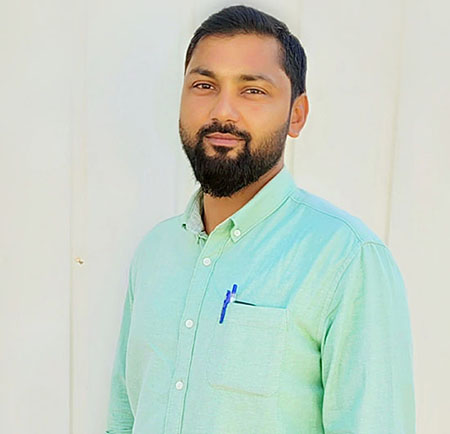We must be open to continuous learning and never assume we know it all—because in our profession, that’s simply not possible.
Case Study: Mohammed M. Raza Qadri
NEBOSH Diplomate Mohammed M. Raza Qadri is a Loss Prevention Advisor who works in the Oil and Gas industry in Saudi Arabia. In this interview, Mohammed shares his advice for how to effectively manage change and identifies the qualities he believes are vital to be a successful health and safety practitioner.

Mohammed, you have worked in health and safety for over 14 years. How did you secure your first opportunity?
My journey into the HSE field commenced through an internship programme, where I served as a Junior Safety Officer at a refinery. During this work experience I was entrusted with responsibilities related to ensuring PPE compliance, providing direct support to frontline site operations and work permit coordination.
This role offered invaluable hands-on exposure to operational safety practices and significantly enhanced my understanding of process safety protocols and hazard communication frameworks. I found the work satisfying, and decided I wanted Health and Safety to be my career.
You have been based in Saudi Arabia since 2011 and have worked in several sectors including Construction, Iron and Steel Manufacturing and Oil and Gas. Having moved between sectors more than once, do you have any tips to help others to manage change well?
From the outset of my career, I’ve actively pursued opportunities across a range of sectors to build broad and valuable experience, recognising that each industry has its own unique risk profile. Moving between sectors such as construction, manufacturing, and oil and gas has deepened my knowledge of the different risk profiles each environment presents, and highlighted the critical importance of adaptability, lifelong learning, and a forward-thinking approach.
One piece of advice I consistently share with peers facing transitions is to view change not as a challenge, but as a powerful opportunity for growth. Take the time to understand the operational details of each sector, commit to enhancing transferable skills, and be open to mentorship and constructive feedback. These strategies not only foster resilience but also accelerate professional development.
In 2023, you joined your currently employer which operates in the Oil and Gas industry. You were initially employed as a Project HSE Advisor but became a Loss Prevention Advisor in 2024. Can you tell us about these roles?
The core distinction between a Project HSE Advisor and a Loss Prevention Advisor lies in the scope of their focus. The former is primarily concerned with operational oversight, while the latter takes a broader view, concentrating on strategic risk management.
As a Project HSE Advisor, I was responsible for ensuring compliance at the project level through site inspections, delivering targeted safety training, and providing incident response and investigation support.
Since stepping into the Loss Prevention Advisor role in 2024, my scope has expanded. I now lead initiatives aimed at detecting emerging safety trends, assessing cross-functional vulnerabilities, and designing forward-looking interventions to protect personnel, infrastructure, and business continuity.
In 2024 you completed the NEBOSH Level 6 International Diploma for Occupational Health and Safety Management Professionals with NEBOSH Gold Learning Partner NIST Global Why did you choose this qualification and how did it help you?
Pursuing the NEBOSH International Diploma was a planned next step in my commitment to continuous professional development, after completing the NEBOSH International General Certificate and other certifications. I selected this qualification because of its globally recognised and demanding curriculum which would deepen my knowledge in health, safety, and environmental management, and help to refine my ability to contribute strategically to evolving global safety needs.
My Diploma studies provided a solid grounding in the core principles of health and safety, environmental management, and risk profiling. Earning this NEBOSH International Diploma marked a pivotal moment in my career. It provided a comprehensive foundation in core principles such as hazard identification, risk management, and regulatory compliance, empowering me to implement effective safety controls and contribute meaningfully across a range of industry settings.
Please, can you tell us about your future ambitions?
I am committed to continuously advancing my safety and leadership capabilities as I work towards becoming a proactive and visionary safety leader. My goal is to build a culture of prevention and accountability at all levels of the organisation.
With a forward-thinking mind-set, I want to be a future thinker; harnessing the opportunities and addressing the risks that come with innovations such as robotic machinery, artificial intelligence, and nanotechnology.
My goal is to help create safer, more adaptable workplaces. I aim to take on a senior leadership role to guide safety strategy, mentor future professionals, and promote initiatives that protect people and assets for long-term success.
What qualities do you think help an individual be an effective health and safety professional?
OSH professionals must avoid complacency. Risks are dynamic, and we should not assume that safeguards that have worked in the past are infallible. Adopting a mindset of continuous improvement and proactiveness is essential for all OSH professionals.
Equally vital is the quality of perseverance. Safety recommendations often face resistance whether from frontline personnel or leadership teams. Persistence, diplomacy, and clear communication are key to articulating the rationale behind your guidance.
In essence, the most effective safety professionals are those who combine deep technical knowledge with strong interpersonal and strategic capabilities. Their success is rooted in resilience, adaptability, and a lifelong commitment to professional growth, attributes that are necessary in today’s dynamic safety landscape.
What advice would you give someone who aspires to make health and safety their career?
My advice is simple: The key to success in the field of occupational health and safety lies in staying informed and continually updating your expertise. Being an OHS professional is challenging due to the constant changes we face that are driven by technology, environmental factors, and the dynamic nature of risk. To be successful we must remain open to continuous learning and never assume we know it all—because in our profession, that’s simply not possible.
